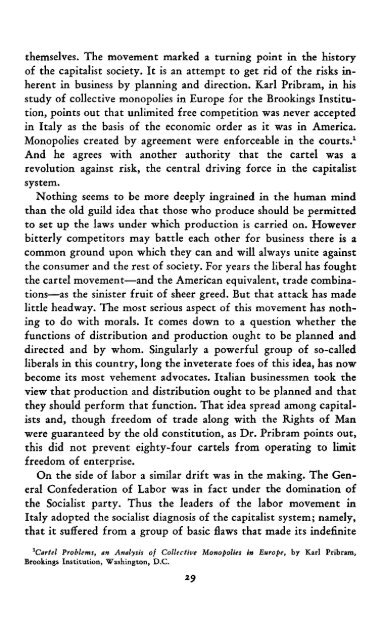- Page 2 and 3: AS WE GO MARCHINGBY JOHN T. FLYNNPr
- Page 4 and 5: CONTENTSPreface by Ronald Radoshvii
- Page 6 and 7: PREFACEby Ronald RadoshThe former P
- Page 8 and 9: merits that preceded" Hitler, Flynn
- Page 10 and 11: spending was most prolific for mili
- Page 12 and 13: Flynn's prototype American fascist
- Page 14: It was the expression of such views
- Page 17 and 18: witnesses and I have sought to stud
- Page 20 and 21: PART ONETHE SOIL OF FASCISM:ITALYI
- Page 22 and 23: understand is that these fascist di
- Page 24 and 25: during the next sixty-two years bec
- Page 26 and 27: forming to the general pattern of W
- Page 28 and 29: tion of economic laws and out of ce
- Page 30 and 31: each reasonably within the mental g
- Page 32 and 33: money was concerned. But he proved
- Page 34 and 35: an invention of present-day reforme
- Page 36 and 37: great remittances of cash from her
- Page 38 and 39: directed almost wholly at the ambit
- Page 40 and 41: a national economic necessity. Then
- Page 42 and 43: for imperialism. For eighteen years
- Page 44 and 45: more impressed by the disturbing fa
- Page 46 and 47: internal troubles. He provided a pr
- Page 50 and 51: workers and all would be workers. T
- Page 52 and 53: of Milanese syndicalism and the ric
- Page 54 and 55: the corrupt politicians who ruled t
- Page 56 and 57: must not enclose itself within the
- Page 58 and 59: ous fruits for Italy now. Yet the e
- Page 60 and 61: The soldiers streamed back to the c
- Page 62 and 63: Over all this the great Russian bol
- Page 64 and 65: He made it plain that he had no res
- Page 66 and 67: Mussolini, whose chief aim was powe
- Page 68 and 69: agreed among themselves on certain
- Page 70 and 71: to pay contractors without increasi
- Page 72 and 73: noticed into the thinking of all so
- Page 74 and 75: trade and professional estates alon
- Page 76 and 77: save that ancient one—more and mo
- Page 78 and 79: summons by violent measures which c
- Page 80 and 81: every section—rushed with their d
- Page 82 and 83: countries a party calling for a rig
- Page 84 and 85: commanding the love of the people.
- Page 86 and 87: government is the opposite of this.
- Page 88 and 89: the practical men and that the worl
- Page 90 and 91: Vatican, said in 1936 that all the
- Page 92 and 93: The great fascist evangelist did no
- Page 94 and 95: of a handful of brutal and lawless
- Page 96 and 97: movement. Had fascism entered Germa
- Page 98 and 99:
younger critics and victims of Hitl
- Page 100 and 101:
without success. Even after an atte
- Page 102 and 103:
grew in virulence as a social irrit
- Page 104 and 105:
evils. What, actually, had happened
- Page 106 and 107:
must make itself responsible for th
- Page 108 and 109:
came the paradise ot state-owned en
- Page 110 and 111:
Of this amount 96,929,000,000, or 6
- Page 112 and 113:
steel production was back to the pr
- Page 114 and 115:
agriculture, and great sums were sp
- Page 116 and 117:
foreigners. It was these foreign lo
- Page 118 and 119:
machine. By militarism I mean that
- Page 120 and 121:
and were called "democrats," they p
- Page 122 and 123:
was far more poignant and imperious
- Page 124 and 125:
in taxes were required in order to
- Page 126 and 127:
in extent, imposes a system, not me
- Page 128 and 129:
state. To cap it all he emphasized
- Page 130 and 131:
one of the most destructive intelle
- Page 132 and 133:
liferated, spread out until it occu
- Page 134 and 135:
with the community represented on t
- Page 136 and 137:
epublic became the great imposer an
- Page 138 and 139:
control better adapted to their app
- Page 140 and 141:
German romantic school of philosoph
- Page 142 and 143:
for poverty? To even debate whether
- Page 144 and 145:
evolutionary episodes, but in a spi
- Page 146 and 147:
welfare institutions, and to extend
- Page 148 and 149:
known later as Federgeld—feather
- Page 150 and 151:
State share in profits of all large
- Page 152 and 153:
Klaus Mann observe that "there was
- Page 154 and 155:
lend. But the mainstay of borrowing
- Page 156 and 157:
income rose from 45 billion in 1933
- Page 158 and 159:
However, it would not be true to sa
- Page 160 and 161:
to its interference and control and
- Page 162 and 163:
fully developed the two most import
- Page 164 and 165:
he lived with becoming modesty in a
- Page 166 and 167:
taking over all trusts by the state
- Page 168 and 169:
ence. Von Papen was toying with the
- Page 170 and 171:
£luence. The stronger leaders who
- Page 172 and 173:
indigent, the many former socialist
- Page 174 and 175:
when he toured this country was rec
- Page 176 and 177:
may have widely hostile opinions ab
- Page 178 and 179:
the people themselves do appear, in
- Page 180 and 181:
well to be clear upon the central p
- Page 182 and 183:
fascism may rise thus. We have but
- Page 184 and 185:
artisan" of Greece, went through al
- Page 186 and 187:
1937 we beheld the painful ascent u
- Page 188 and 189:
The sources of power and energy are
- Page 190 and 191:
i3· Justice to disabled war vetera
- Page 192 and 193:
utilities such as streets, water wo
- Page 194 and 195:
ureaus and eliminating extravagance
- Page 196 and 197:
President made it clear that he was
- Page 198 and 199:
When, therefore, these vast expendi
- Page 200 and 201:
great inventions as the railroads,
- Page 202 and 203:
to pay. The other is for the Govern
- Page 204 and 205:
such things. A democratic governmen
- Page 206 and 207:
try, organized into local groups un
- Page 208 and 209:
than facing all these angry forces
- Page 210 and 211:
sity of changes in our laws to enco
- Page 212 and 213:
the management of its multitudinous
- Page 214 and 215:
dark history of the Russian experim
- Page 216 and 217:
cult of planning offered to minds t
- Page 218 and 219:
We have left the period of extreme
- Page 220 and 221:
Since the war effort got under way
- Page 222 and 223:
pipe lines, electric power, water p
- Page 224 and 225:
for the peace. Mr. Arthur Sulzberge
- Page 226 and 227:
the federal system will be itself s
- Page 228 and 229:
effective than war as an antidote a
- Page 230 and 231:
in the corner. The knowledge of the
- Page 232 and 233:
of obtaining the consent of the peo
- Page 234 and 235:
system, whose planning must be prot
- Page 236 and 237:
Americans of today can hardly reali
- Page 238 and 239:
destiny and duty and holding aloft
- Page 240 and 241:
And now, nearly forty years later,
- Page 242 and 243:
In a period of depression—and we
- Page 244 and 245:
have overwhelmed other nations. Nev
- Page 246 and 247:
make fascism. This may be called th
- Page 248 and 249:
him. I say probably, because one ca
- Page 250 and 251:
We have a dictator when the unlimit
- Page 252 and 253:
hundred other things, including edu
- Page 254 and 255:
Something like this has already hap
- Page 256 and 257:
There is something in all this alar
- Page 258 and 259:
Congress for an appropriation, the
- Page 260 and 261:
under the pretense of interstate co
- Page 262 and 263:
We must take note here of the plans
- Page 264 and 265:
of congressional power—to govern
- Page 266 and 267:
of this money had been appropriated
- Page 268 and 269:
nominate and by and with the advice
- Page 270 and 271:
once again, let us repeat that the
- Page 272 and 273:
the hands of perfectly authentic Am
- Page 274 and 275:
never resort to assassination and s
- Page 276 and 277:
pile up. The loan of 1933 that pump
- Page 278 and 279:
BibliographyITALYAmoruso, Vincenzo,
- Page 280 and 281:
Flink, Salomon, The German Reichsba
- Page 282 and 283:
Veblcn, Thorstein, The Engineers an
- Page 284 and 285:
Bonomi, Ivanoe, Italian Premier, 59
- Page 286 and 287:
General Confederation of Labor, in
- Page 288 and 289:
Merriam, Dr. Charles, on streamlini
- Page 290 and 291:
Scott, Howard, and technocracy, 169
- Page 292:
JOHN T. FLYNN was an author and jou



